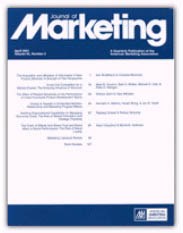
Keller, K. and Guyt, J. (2025). Consequences of Bottle Bills: How Bottle Deposit Return Schemes Affect Retail Prices and Lead Consumers to Larger Package Sizes Journal of Marketing, :.
-
Affiliated author
-
Publication year2025
-
JournalJournal of Marketing
Plastic waste has doubled in the past two decades, and less than 10% of plastic waste is recycled. “Bottle bills” are legislation to combat plastic waste by increasing recycling rates, by adding a per-bottle deposit that gets refunded to consumers who return empty containers. Industry experts are divided over the retail sales and price implications of such measures. To clarify the implications of such legislation, the current study uses a synthetic difference-in-differences approach to investigate how New York{\textquoteright}s 2009 law, targeting pure bottled water in containers < 128 fl. oz., affected consumers and retailers in terms of whether prices of bottled beverages changed and whether the bottle bill affected sales of bottled beverages. The study also identifies three mechanisms that can drive such effects. The results reveal that retailers increased prices of items covered by the bottle bill by 4% while keeping prices of other items, outside the bottle bill{\textquoteright}s scope, constant. Volume sales in the water category decreased by 6%. This study finds substantial differences in these effects across package sizes and provides suggestive evidence that consumers{\textquoteright} ideological aversion and retailers{\textquoteright} additional operational effort and holding costs are related to these sales and price changes.